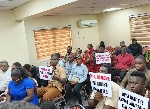Majority accuses Minority of blocking incentives for businesses
 Alexander Afenyo-Markin and Casiel Ato Forson
Alexander Afenyo-Markin and Casiel Ato Forson
The Parliament of Ghana has yet to grant tax exemptions for 42 selected companies under the One District, One Factory (1D1F) programme, due to delays by the Parliament’s Finance Committee in completing the scrutiny of these companies.
The Majority Leader, Mr Alexander Afenyo-Markin, has criticized this delay as a deliberate move by the Minority to hinder the government's efforts to attract investment into the country.
In 2021, the government requested Parliament to approve tax exemptions for various businesses participating in the flagship 1D1F industrialization policy.
This initiative aimed to signal to the international investor community that Ghana is a favourable environment for business, thus boosting economic contributions.
However, the process has been impeded by extensive parliamentary delays, particularly due to demands for further deliberation and scrutiny by members of the Minority caucus.
Mr Cassiel Ato Forson, a prominent figure in the Minority, has strongly opposed advancing the entire exemptions list from the committee stage, citing irregularities with some listed companies and their respective requested amounts in tax exemptions.
The Minority also rejected a proposal to present 15 companies, deemed free of irregularities, to the floor of Parliament, leaving the Majority Leader visibly frustrated. While some arguments against presenting the list may have merit, the prolonged delay—now in its fourth year—raises concerns about an intentional effort to obstruct the government's agenda.
The delays threaten to stifle industrial growth.
These exemptions are designed to reduce operational costs, making it more attractive for businesses to establish and expand their operations.
Without these incentives, affected companies may scale back their plans, leading to slower industrialization and fewer job opportunities, thereby undermining the 1D1F programme's objectives.
Moreover, the ongoing impasse could negatively affect investor confidence in Ghana.
International investors seek stability and predictability in economic policies.
The perception of political gridlock and uncertainty surrounding the tax exemption process may deter potential investors, who fear similar bureaucratic hurdles and a lack of policy consistency in the future.
It is imperative for Parliament to leverage its unique numerical composition to foster strong bipartisan relations for the benefit of Ghana.
Healthy bipartisan collaborations invariably create more stable environments that favour businesses, irrespective of the government in power.
Ensuring the timely approval of these tax exemptions could enhance Ghana’s industrialization efforts and signal to the global investor community that the country is committed to creating a conducive business environment.
As the situation unfolds, the focus remains on whether Parliament can resolve these delays and move forward with the necessary approvals to support the 1D1F programme and the broader economic goals of the nation.
Source: Classfmonline.com/Cecil Mensah
Trending Business

Bank of Ghana holds post-MPC engagement with bank CEOs after 127th meeting
03:53
Ghana's Cybele Energy makes history with offshore Guyana oil block deal
12:53
IBAG elects new executives at 12th general meeting
04:57
First Atlantic Bank PLC set for official listing on the Ghana Stock Exchange
12:46
SIC Managing Director James Agvenim-Boateng honoured by IBAG
05:34
IMF technical mission engages Ghana on implementing governance reforms
05:08
NPA hosts 2025 Downstream CEOs breakfast meeting to shape industry’s future
15:16
Ghana to establish Trade House in the UK to boost exports — High Commissioner reveals
15:05
VEMAG raises concerns over DVLA's digital number plate rollout, citing job losses
13:30
DVLA introduces temporary registration number sticker for non-fleet vehicle owners
12:05




